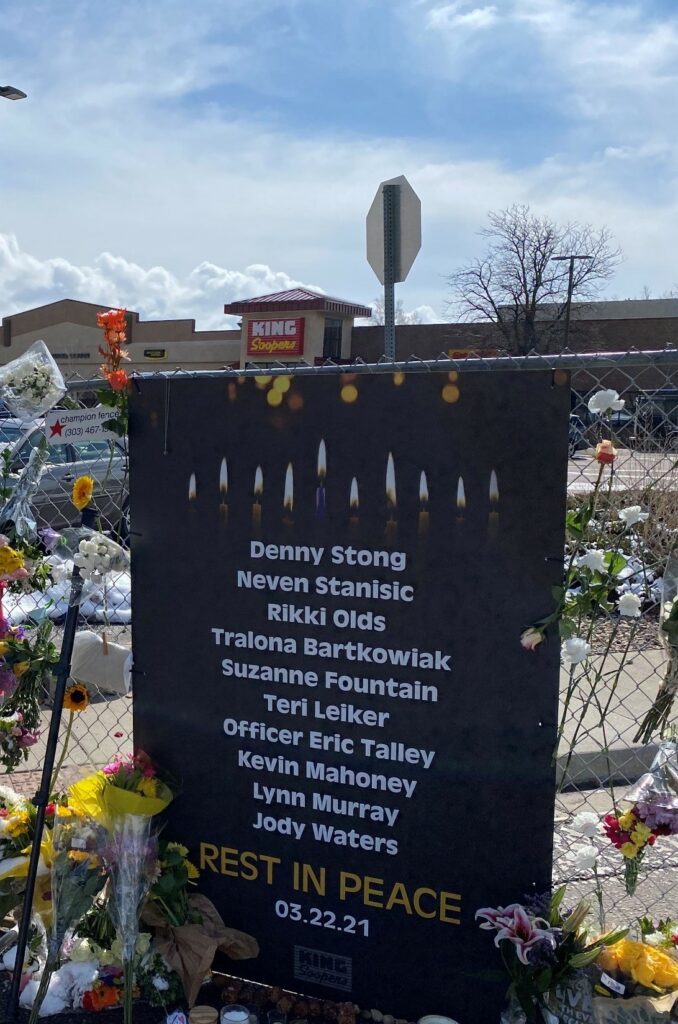
Yesterday’s horrific, incomprehensible shooting in Boulder left all of us shaken, saddened, and in a state of disbelief. Leading up to yesterday, I was preparing a blog post for today, March 23, 2021, regarding the overwhelming dread and palpable fear of one year ago, March 23, 2020. In the wake of a mass killing in your hometown, reflections on financial markets feel banal and trivial – and rightly so. This observation itself is worthy of reflection. Looking back over my notes, though, there are meaningful parallels and connections that have helped to begin processing yesterday’s violence, tragedy, and meaning.
Radical Acceptance
Details on yesterday’s murders remain ill defined. We do know that there were ten innocent victims. Each victim was someone’s daughter, son, brother, sister, mother, father. Imagining the grief and loss of these people, of losing a son or wife to such senseless violence, makes my chest ache. March 2020, when the broader world seemed in free fall and full panic, produced different, yet similarly powerful reactions and emotions.
In both situations, there are two paths we can take. We can become fearful, reactive, and guarded. Or we can acknowledge and accept that we live in a world of uncertainty, loss, and risk; and that despite not being able to control the world around us, we do the best we can, knowing this to be true.
Asymmetrical Outcomes & Mental Health
One year out from the March 2020 financial lows, the COVID-19 pandemic has left devastation in its wake. The toll on lives lost, economic damage, societal implications, etc., is incalculable. During an interview with the distinguished micro-economist Steven Levitt, he discussed the relatively trivial level of biomedical expenditures that would have been necessary to prevent the pandemic. Looking forward, will we fail to prevent a similar, but different, public health crisis? The impending crisis to which I refer is mental health. Yesterday’s shootings in Boulder, last week’s shootings in Georgia, the Capitol political violence, etc. The list goes on and on – and may be symptomatic of the widespread mental health toll exacted by the pandemic. The asymmetrical nature of these outcomes should actually give us hope, as modest focus/energy/attention/funding will yield disproportionate benefits in terms avoided repercussions and costs.
Looking Back, Looking Forward
My March 22, 2020 blog post, “On Resilience . . .”, defined resilience as, “an ability to adapt and recover, often from misfortune, adversity, or change.” Now, as then, we will struggle to make sense of a world that, often and by its nature, does not make sense. Now, as then, we will be tested and challenged by Epictetus’ wisdom from 2000 years ago, when plagues, pandemics, and murder was rife, that, “People are not disturbed by things, but by their opinion of things.” Now, as then, we are heartened and our resolve strengthened by the outpouring of support and messages from our partners and colleagues. And now, as then, we at BSW are here for you, our clients. We are here for our community during this tragedy. And we will be advocates for the path forward and better days ahead.
-David Wolf, CEO
Post-script: Financial support for the victims’ families is being managed by the Colorado Healing Fund and general support organizations have been identified by ColoradoGives.org, a secure way to donate to victims of tragedy.

